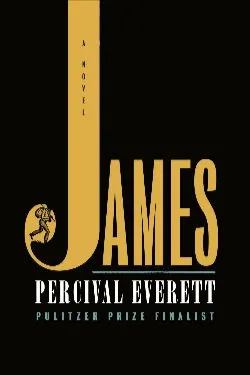
I wanted to love this book, and I did for the first two parts. I went into this book knowing nothing about it, except that it had won the National Book Award for Fiction. I was pleased to see that it was a retelling of The Adventures of Huckleberry Finn from the perspective of Jim, christened here as James. From the start, I was sucked right into the story.
While James beings as a retelling of The Adventures of Huckleberry Finn, Everett veers away from Mark Twain’s story in the second part, and this is to Everett’s credit. What begins as a reinterpretation of Twain’s work becomes a story in its own right, and it’s a massive indictment of American society. This is a book very much speaking to the political issues of the present, including issues regarding “passing,” the limitations of white “allyship,” the self-imposed limitations Black Americans place on themselves in order to appease the larger white supremacist system, and Black personalities that uphold white supremacy: Daniel Decatur Emmett, who claims to be opposed to slavery, is as vicious a slaveholder as any other; it is unclear for much of the story where Norman’s loyalties really lay; Brock maintains the steam engine’s furnace for crumbs, and who likely has not even met his “master”; and Luke is all too-willing to sell out Jim to his brutal overseer.
Everett’s book is especially strong when it pokes fun at white people for their superiority complexes. In Twain’s book, Jim is portrayed as a superstitious fool who doesn’t know a great deal about the world. In Everett’s, Jim plays the fool in order to soothe the egos of white people. The characters code-switch in order to maintain the charade, and the use of language tells us a great deal about who characters consider “in” and who they consider “out.” Strengthening this point, James confronts Locke and Voltaire: Everett pricks little holes in the ideological claims white America makes about itself.
The author also subverts the most important story arc in Huck Finn: Huck’s discovery that Jim is worthy of human dignity. Huck, by the end of the novel, sees beyond race and sees Jim as a human! For what it’s worth, I do believe that Twain’s novel was meant to be–and in many ways continues to be–an anti-racist novel. However, it upholds as many of the racist tropes that it tries to knock down, and Twain’s novel has not aged particularly well. Everett’s book is a necessary corrective here. It is hard for me to escape the impression that, in Twain’s novel, Jim is little more than a literary artifact designed to benefit Huck. Jim is merely a catalyst for Huck’s growth into a self-actualized, bourgeois man. In Everett’s book, this is not true at all. Instead, Huck is now written to catalyze Jim’s growth.
Unfortunately, I don’t think that Everett’s plot succeeds. This is because Everett pushes the story too far in the third act. Rather than Jim remaining a father-figure for Huck–and Huck a metaphorical son for Jim–Huck is literally Jim’s son. In Everett’s story, Jim was very close to Huck’s mother, and the alcoholic Pap was never Huck’s father at all. THIS is why Pap hated Jim. Huck has a hard time making sense of it, but then seems to come to terms with the fact that he is actually Black (but white-passing), according to the larger American society–even if nobody else knows it.
In the third act, the story veers off further. Instead of taking place in the sectarian, antebellum years (presumably the 1840s), word that the United States has fallen into civil war arrives, and we even meet a soldier! Everett uses this to make the case that the Union never went to war to free slaves–which is true (although the South seceded to maintain slavery)–but it comes off as shallow: it’s a literary device included for the sake of commentary, and doesn’t go any deeper.
Upon returning to Hannibal, Missouri, Jim tries to save his wife and daughter, only to learn that they have been sold to a “breeding farm.” James then devolves into Django Unchained for the American literati.
Is the novel cathartic? Yes, absolutely. Is it gratuitous? Also yes. Does it work? No. It did, until it didn’t. I’m not sure that Everett knew how to end the novel, so it became a revenge narrative. I don’t know if I can fault Everett for it, and I’m actually not against this sort of story, but its presentation here is ham-fisted.
Everett’s James is a novel that begins on familiar tracks, takes a detour through beautiful, uncharted scenery, then hurls itself off a burning bridge.